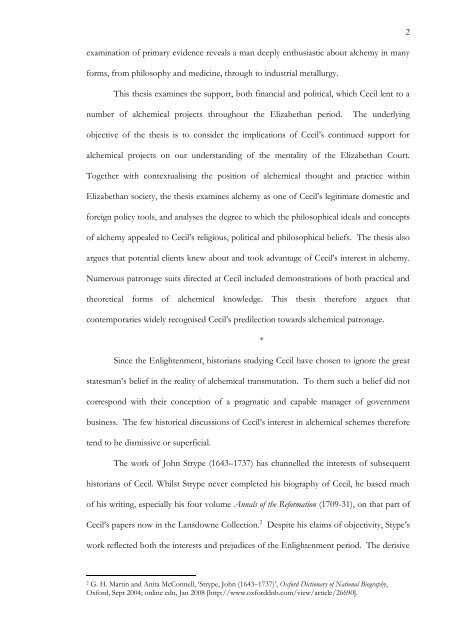The Alchemical Patronage of Sir William Cecil, Lord Burghley
The Alchemical Patronage of Sir William Cecil, Lord Burghley
The Alchemical Patronage of Sir William Cecil, Lord Burghley
Create successful ePaper yourself
Turn your PDF publications into a flip-book with our unique Google optimized e-Paper software.
examination <strong>of</strong> primary evidence reveals a man deeply enthusiastic about alchemy in many<br />
forms, from philosophy and medicine, through to industrial metallurgy.<br />
This thesis examines the support, both financial and political, which <strong>Cecil</strong> lent to a<br />
number <strong>of</strong> alchemical projects throughout the Elizabethan period. <strong>The</strong> underlying<br />
objective <strong>of</strong> the thesis is to consider the implications <strong>of</strong> <strong>Cecil</strong>‘s continued support for<br />
alchemical projects on our understanding <strong>of</strong> the mentality <strong>of</strong> the Elizabethan Court.<br />
Together with contextualising the position <strong>of</strong> alchemical thought and practice within<br />
Elizabethan society, the thesis examines alchemy as one <strong>of</strong> <strong>Cecil</strong>‘s legitimate domestic and<br />
foreign policy tools, and analyses the degree to which the philosophical ideals and concepts<br />
<strong>of</strong> alchemy appealed to <strong>Cecil</strong>‘s religious, political and philosophical beliefs. <strong>The</strong> thesis also<br />
argues that potential clients knew about and took advantage <strong>of</strong> <strong>Cecil</strong>‘s interest in alchemy.<br />
Numerous patronage suits directed at <strong>Cecil</strong> included demonstrations <strong>of</strong> both practical and<br />
theoretical forms <strong>of</strong> alchemical knowledge. This thesis therefore argues that<br />
contemporaries widely recognised <strong>Cecil</strong>‘s predilection towards alchemical patronage.<br />
*<br />
Since the Enlightenment, historians studying <strong>Cecil</strong> have chosen to ignore the great<br />
statesman‘s belief in the reality <strong>of</strong> alchemical transmutation. To them such a belief did not<br />
correspond with their conception <strong>of</strong> a pragmatic and capable manager <strong>of</strong> government<br />
business. <strong>The</strong> few historical discussions <strong>of</strong> <strong>Cecil</strong>‘s interest in alchemical schemes therefore<br />
tend to be dismissive or superficial.<br />
<strong>The</strong> work <strong>of</strong> John Strype (1643–1737) has channelled the interests <strong>of</strong> subsequent<br />
historians <strong>of</strong> <strong>Cecil</strong>. Whilst Strype never completed his biography <strong>of</strong> <strong>Cecil</strong>, he based much<br />
<strong>of</strong> his writing, especially his four volume Annals <strong>of</strong> the Reformation (1709-31), on that part <strong>of</strong><br />
<strong>Cecil</strong>‘s papers now in the Lansdowne Collection. 2 Despite his claims <strong>of</strong> objectivity, Stype‘s<br />
work reflected both the interests and prejudices <strong>of</strong> the Enlightenment period. <strong>The</strong> derisive<br />
2 G. H. Martin and Anita McConnell, ‗Strype, John (1643–1737)‘, Oxford Dictionary <strong>of</strong> National Biography,<br />
Oxford, Sept 2004; online edn, Jan 2008 [http://www.oxforddnb.com/view/article/26690].<br />
2















